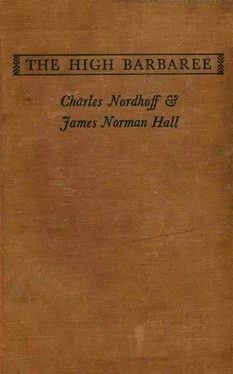Both engines were dead now and Henderson Field seemed very far away as Brooke brought the plane down in a flat glide. Glancing aft, Mauriac had seen the sub rise bow up and disappear in seething water mixed with oil. Then a great explosion shot spray and debris high in air. Scarcely a mile distant, the High Barbaree squattered down unsteadily and came to rest. Turning, Mauriac had seen the radioman slumped beneath the starboard waist gun in a pool of blood. Then he heard Brooke calling: “Gene! Gene!”
Torn and gashed as she was by shellfire, some freak of battle had preserved the Catalina’s hull from serious damage below the waterline. She rode the sea well, but her topsides were so badly riddled it seemed a miracle that neither Brooke nor Mauriac had been hit. The radio compartment was a wreck and three of their water breakers had been holed by machine-gun fire or fragments of shell.
The two survivors spent a grim afternoon plugging what holes there were below the waterline and bringing some order from the chaos within the plane. The night, when they buried their dead comrades, was grimmer still, and lonelier.
Toward midday the breeze freshened and heavy rain clouds were banking up in the east. Drifting slowly astern as she rode to her sea anchor, the Catalina faced the wavelets that slapped briskly at her bow. At noon when Mauriac took a latitude, Brooke was awake. Together they examined once more the plugged holes in the hull. So little water had seeped through that they were able to clear it easily with their hand bilge pump. Neither of them had eaten in more than twenty-four hours. They now felt a sudden sharp appetite. There was plenty of food for the time being, including a hamper filled with fruit.
The Catalina was equipped with five three-gallon breakers for water and all had been filled before the take-off. Two gallons had been used during the patrol. A full breaker had been so holed that no water remained in it, and another had lost half its contents. Being hopeful, the two men allowed themselves a pint of water each at this first meal.
The distant curtain of clouds, bearing slowly down on them, cast its cool shadow over the sea. Then the sun was hidden; the breeze slackened as the squall approached, to be succeeded by a sharp cold gust that made the plane dip and roll uneasily. Then it was dead calm once more and a light vertical rain began to fall. They were prepared for it and saved two gallons before the shower ceased. The sky brightened a little and it was soon evident that no more rain would come. Brooke handed the containers down through the hatch to Mauriac, who stowed them safely below. A moment later the navigator heard him calling: “Gene! Come up here, quick!”
Listening so intently that they scarcely dared breathe, the two men heard the droning of far-distant motors, now clearly audible, now dying away to silence in the flaws of air. Little by little the volume of sound increased. It was coming from the west.
Though the ceiling was still low, the clouds were beginning to break; here and there golden shafts of sunlight fell upon the sea. Brooke pulled out the pin of a smoke grenade and they watched the dense murky billows trail slowly to leeward, a signal that would have been visible at a great distance on a clear day. The plane was still hidden by clouds though the sound of its motors now filled the air.
“It’s a Cat,” Mauriac said, in a tense voice. “Oh, God, let ’em see us!”
They stared upward, their hopes high. Then, for the fragment of a second, they had a glimpse of the friendly plane, indistinct and wreathed in vapor as it flitted like a ghost across a lane of partially clear air between two clouds.
Straining their eyes they stood silent, expecting every moment to hear the subdued sound of the engines as the Catalina turned to glide to a lower level. But the steady droning remained unchanged, save that the sound diminished, to die away completely at last. The silence of mid-ocean flowed into the vacuum made by its passage.
They had no illusions about the gravity of their situation, but they were young, full of life, and, on the evening of the fourth day, still hopeful. The sun was near to setting and the light breeze died away until only the faintest cat’s-paws blurred the reflections of a few scattered clouds that seemed as motionless as the derelict plane. Presently Mauriac said: “You can’t see it, Alec, but there’s a kind of aureole around your head—an angelic golden light. Nearest thing I’ve ever seen to a halo.”
Brooke smiled.
“Already? I don’t see any around yours.”
“That’s where a towhead scores. You don’t know how other-worldly you look with that corona.”
“What were you thinking about just now?”
“I was going to tell you. I was thinking of the jam we’re in; and then, all of a sudden, the lines of a song I heard over the radio popped into my head.”
“What song is that?”
“An old-timer, I guess. It sounds like one:—
The Cat came back;
He couldn’t stay no longer
So the Cat came back
The very next day . . .
Pretty, don’t you think? And comforting to men in our fix.”
Brooke clasped his hands around his knees.
“I know that song,” he said. “It is an old-timer; I’ve heard my dad sing it. It’s a Capital-C Cat with wings, with an old spitting tom painted on the hull. But not this one. She’ll never come back anywhere again.”
“One of ours will. I don’t know about ‘the very next day.’ ”
“That means tomorrow. Gene, we’ll make that our Vesper hymn. Let’s have it again. Come on, now; wring it out, this time.”
The Cat came back;
He couldn’t stay no longer
So the Cat came back
The very next day.
Yes, the Cat came back;
He couldn’t stay no longer
But the Cat came back
’Cause he wouldn’t stay away.
“I’ll bet that’s never been sung with more enthusiasm,” Mauriac said. “You put a lot of conviction into it, Alec.”
“Brother, I’ve got conviction. That was one of our outfit, certainly, that we caught a glimpse of.”
“Sure it was. They won’t give up after one search on a cloudy day. But there’s an awful lot of sea to cover.”
“Gene . . .”
“Yes?”
“What did you say our position was, yesterday, at noon?”
“One hundred and sixty-one degrees, twenty-nine minutes east; forty-six minutes north.”
Brooke was silent for some time; then he remarked: “That’s curious! More than curious!”
“What’s curious about it?”
“Ever hear of Turnbull’s Island?”
“Never.”
“It’s not a hundred miles west of where we are now, and in the same latitude.”
Mauriac smiled.
“Dream on! You’re telling this to your navigator? You don’t really believe there is such an island?”
“I’ve believed in Turnbull’s Island ever since I was ten years old.”
“You’re crazy, Alec! It’s not on the charts, and I’ve got the best Uncle Sam provides.”
“I’ve heard you admit that they’re none too accurate for this region. Furthermore, the Hydrographic Office hasn’t checked on every square mile of the Pacific.”
“It doesn’t have to. Was this what’s-its-name island supposed to be high or low?”
“High. A thousand feet high.”
“Not a hope, Alec. Not a hope. Do you suppose any island, high or low, would have a chance to remain undiscovered?”
“Why not, in this part of the Pacific? It was a mighty lonely region up to the outbreak of the war. . . . Got a copy of Yardley’s Pacific Directory?”
“Never heard of it.”
“I suppose it’s out of print in these days. There’s an account of Turnbull’s Island in Yardley; at least there was, in an edition I saw years ago.”
Читать дальше












